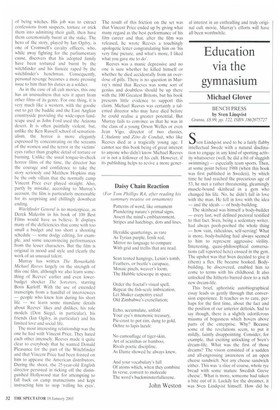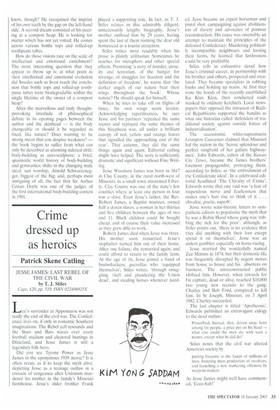Education via the gymnasium
Michael Glover
BENCH PRESS by Sven Linqvist
Grano, £8.99, pp. 122, ISBN 1862075727
Sven Lindqvist used to be a fairly flabby intellectual Swede with a natural disclination to engage in any kind of sporting activity whatsoever (well, he did a bit of sluggish swimming) — especially team sports. Then, at some point before 1988 (when this book was first published in Sweden), by which time he had reached the precarious age of 53, he met a rather threatening, gleamingly muscle-bound skinhead in a Tim who changed his life. No, he didn't fall in love with the man. He fell in love with the idea
— and the ideals — of body-building.
The skinhead was himself a body-builder — every last, well defined pectoral testified to that fact. Sven, being a sedentary writer, had always pooh-poohed the whole thing — how vain, ridiculous, self-serving! What is more, body-building had always seemed to him to represent aggressive virility. Interesting, quasi-philosophical conversations (all reported here) ensued in the gym. The upshot was that Sven decided to give it (them) a flex. He became hooked. Bodybuilding, he discovered, enabled him to come to terms with his childhood. It also unlocked the hitherto barred door to a rich new dream-life.
This brief, aphoristic autobiographical essay leads us gently through that conversion experience. It teaches us to care, perhaps for the first time, about the fact and the position of our anterior deltoids. Sad to say though, there is a slightly odoriferous miasma of bogusness which hovers above parts of the enterprise. Why? Because some of the revelations seem, to put it mildly, faintly disappointing. Consider, for example, that exciting unlocking of Sven's dream-life. What was the first of those dreams? The vision consisted of a sudden and all-engrossing awareness of an open cheese sandwich. Not any cheese sandwich either. This was 'a slice of coarse, whole rye bread with some mature Swedish Greve cheese'. What is more, someone had taken a bite out of it. Luckily for the dreamer, it was Sven Lindqvist himself. How did he know, though? He recognised the imprint of his own teeth by the gap on the left-hand side. A second dream consisted of his peering at a compost heap. He is looking for matter which has not yet rotted, He comes across various bottle tops and rolled-up toothpaste tubes.
How do those visions rate on the scale of intellectual and emotional enrichment? The most interesting question that they appear to throw up is: at what point in their intellectual and emotional evolution did Swedes such as Sven reach the conclusion that bottle tops and rolled-up toothpaste tubes were biodegradable within the single lifetime of the owner of a compost heap?
After the marvellous and truly thoughtprovoking interlude of philosophical debate in its opening pages between the author and the skinhead — is the body changeable or should it be regarded as fixed, like nature? Does wanting to be strong mean that you despise weakness? — the book begins to suffer from what can only be described as alarming sidereal drift: body-building as auto-sculpture; a brief, spasmodic world history of body-building and gymnastics; shifts in the changing male ideal; sun worship; Arnold Schwarzenegger, biggest of the big; and, perhaps most intriguing of all, the fact that Sir Arthur Conan Doyle was one of the judges of the first international body-building contest in 1901.



























































 Previous page
Previous page